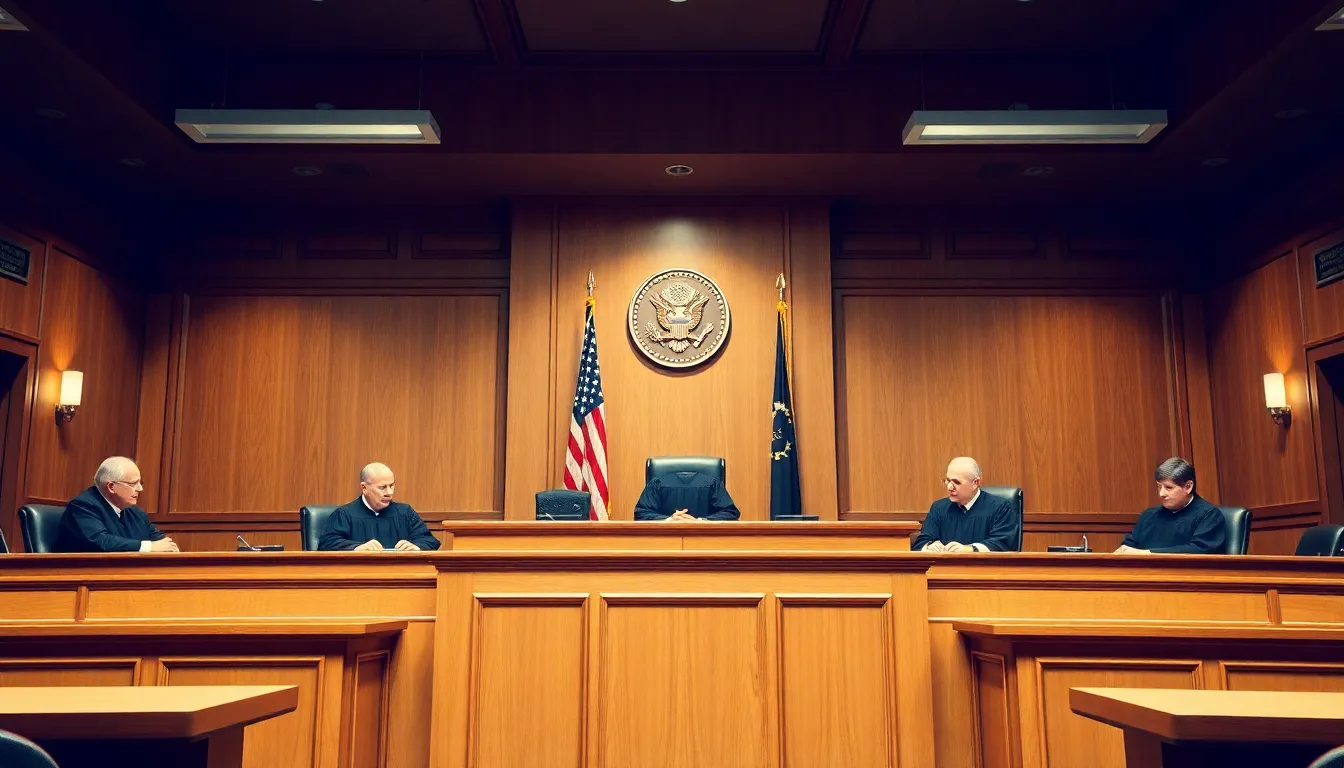When it comes to legal drama, the Trump administration certainly knows how to keep the audience on the edge of their seats. Picture this: a high-stakes showdown in Maryland, where the administration takes a bold step and sues federal judges. It sounds like the plot of a political thriller, but it’s real life—and it’s unfolding right before our eyes.
As the courtroom antics unfold, questions arise about the implications for the judiciary and the balance of power. Are these legal maneuvers a strategic play or just a case of political theatrics? Buckle up as we dive into the whirlwind of legal battles, courtroom strategies, and the ever-entertaining world of American politics. This isn’t just a lawsuit; it’s a spectacle that’s sure to leave everyone talking.
Table of Contents
ToggleOverview of the Lawsuit
The Trump administration initiated a lawsuit against federal judges in Maryland, citing alleged overreach in their rulings. This legal action stems from several cases where judges challenged the administration’s policies. The lawsuit argues that the judiciary has exceeded its authority, impacting executive power.
Claims made in the lawsuit focus on specific judicial decisions perceived as politically motivated. Legal representatives assert that these rulings threaten the separation of powers established in the U.S. Constitution. They contend these judges have overstepped their bounds, setting a dangerous precedent for judicial involvement in executive matters.
Courtroom strategies will play a significant role in the unfolding of this case. The administration’s legal team intends to present evidence that establishes the judges acted outside their jurisdiction. Additionally, they plan to argue that these decisions impair the administration’s ability to govern effectively.
The case has implications beyond this immediate legal dispute. Observers note that it raises questions about the independence of the judiciary. Political analysts highlight the potential ramifications for future interactions between the branches of government.
Documented responses from legal experts indicate a divided opinion on the administration’s chances of success. Some believe the lawsuit reflects a rising trend of executive challenges to judicial authority. Others caution that the judiciary might validate its role in checks and balances, rejecting the claims of overreach.
Monitoring the developments of this lawsuit reveals its significance in the broader context of American politics. As proceedings continue, the outcome could reshape perceptions of judicial limits and executive power dynamics.
Background of the Trump Administration’s Legal Actions

The Trump administration’s lawsuit against federal judges in Maryland marks a critical moment in U.S. politics. This lawsuit stems from ongoing tensions between the executive branch and the judiciary.
Key Events Leading to the Lawsuit
Judicial decisions impacting the administration’s policies sparked significant concern. Specific rulings challenged key initiatives, prompting the administration to assert judicial overreach. Several high-profile cases, including immigration and healthcare legislation, heightened these tensions. In response, the administration’s legal team gathered evidence to support claims of politically motivated judicial actions. Various public statements by administration officials emphasized the perceived threat to the separation of powers.
Implications of the Legal Landscape
The lawsuit underscores potential shifts in the balance of power among branches of government. Concerns regarding judicial independence could influence future interactions between the executive and judicial branches. Legal experts suggest that this case might set a precedent for similar challenges to judicial authority. The ongoing case raises questions about the extent of judicial involvement in enforcing executive policies. Outcomes from these legal battles may redefine the boundaries of executive power within American politics.
The Case Against Federal Judges in Maryland
The Trump administration’s lawsuit against federal judges in Maryland centers on alleged judicial overreach. Intended to challenge certain rulings, the administration claims these decisions obstruct its authority.
Details of the Lawsuit
The legal action targets specific rulings made by judges affecting the administration’s immigration policies and healthcare initiatives. Filed in the District Court, the lawsuit accuses judges of exceeding their judicial bounds. Aiming to restore executive power, it demands a reevaluation of the judges’ decisions. Administrative officials emphasize the need to uphold the Constitution’s separation of powers. Legal representatives stress that these judicial rulings create a precedent that could hinder future governance.
Key Arguments Presented
Legal arguments assert that the judiciary’s actions interfere with executive functions. Allegedly, judges have made politically charged rulings rather than focusing on legal parameters. The administration contends that these decisions erode public trust in the judicial system. Evidence is being gathered to support claims of impropriety. Furthermore, administration officials highlight the potential threat these judicial precedents pose to future executive actions. The lawsuit frames this conflict as a pivotal moment in defining the boundaries of governmental authority.
Reactions to the Lawsuit
Reactions to the Trump administration’s lawsuit against federal judges in Maryland generate diverse perspectives across the legal and public landscape. Legal opinions vary greatly, reflecting deep divides on the implications of this case.
Opinions from Legal Experts
Legal experts express mixed views on the lawsuit’s potential success. Some believe it represents a concerning trend of executive overreach into judicial matters. They argue the administration’s claims of judicial overreach might fail in court, as judges uphold constitutional principles. Others contend the lawsuit could spark critical legal discussions about the judiciary’s role in governance. A few experts see the administration’s actions as a necessary challenge to perceived biases in judicial rulings. The outcome may significantly influence future executive-judicial relations.
Public Response and Media Coverage
Public response to the lawsuit varies. Many individuals express concern over the administration’s confrontational stance towards the judiciary. Others rally in support of the administration, viewing the lawsuit as a defense of executive power. Media coverage highlights polarized opinions with headlines emphasizing the stakes involved. Several outlets analyze the broader political ramifications of the lawsuit, noting its potential impact on upcoming elections. Online discussions frequently debate the implications for judicial independence. Overall, media narratives shape the public’s understanding of the ongoing legal battles.
Potential Outcomes and Implications
The ongoing lawsuit by the Trump administration against federal judges in Maryland poses significant implications for the judiciary and the political landscape.
Impacts on Judicial Independence
Court rulings come into question as the administration alleges judicial overreach. Judges may find their authority challenged, creating concerns about their ability to make impartial decisions. This lawsuit risks compromising the principle of judicial independence, as executive actions that challenge judicial authority might deter judges from ruling fairly in politically sensitive cases. Heightened scrutiny on judges could lead to a chilling effect on their rulings, affecting future legal interpretations related to executive power. The possibility of being embroiled in political controversies may influence judges, potentially harming public trust in the judicial system.
Effects on Political Climate
Political tensions are likely to escalate as this lawsuit unfolds. Supporters of the administration view this legal action as a necessary pushback against perceived judicial biases, rallying around the executive authority. Opponents, however, see it as a concerning trend that undermines the system of checks and balances. Voters might experience a shift in perspectives, influencing future elections and party alignments. Additionally, media discussions around this lawsuit will shape public opinion and contribute to the polarization of views on judicial roles. Engaged citizens will debate the implications of this lawsuit, affecting their perceptions of governance and accountability in American politics.
The lawsuit initiated by the Trump administration against federal judges in Maryland underscores a pivotal moment in the ongoing struggle between the executive branch and the judiciary. As this legal battle unfolds it could have lasting implications for the balance of power within the U.S. government. The case not only challenges judicial authority but also raises critical questions about the independence of the judiciary in politically charged environments.
With public opinion divided and legal experts weighing in on both sides the outcome may reshape perceptions of judicial limits and executive power. The broader political ramifications of this lawsuit will likely influence future governance and voter perspectives as the nation grapples with the evolving dynamics of power and authority.




